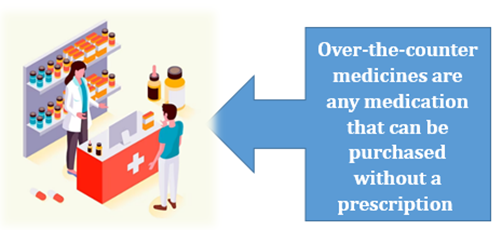Things you should know before keeping medicines at home

In today's era of pandemics, pollution, ready-to-eat, and fast-food culture, we are prone to diseases like never before. Let's explore the precautionary and safety measures of keeping medicines at home.
By Topperlearning Expert 17th Oct, 2023 | 07:19 pm
Share"An Apple a Day Keeps the Doctor Away" is a well-known adage we have all heard from our elders since childhood. People are more susceptible to acute and chronic diseases in this period of pandemics, massive use of chemical fertilizers, ready-to-eat culture, hoteling, pollution, global warming, and the use of plastic for cooking and storing food. At least iron and vitamin supplements and calcium tablets are commonly consumed to boost health and keep pace with fast lifestyle changes. As a result, we must have specific medications at home based on the health types of the people in our household.
WHAT IS A MEDICINE?

PURPOSE OF TAKING MEDICINES:

TYPES OF MEDICINES:
Based on dosage form:
Primarily, medicines can be in the form of :
- Solid
- Liquid
- Gel

Based on prescription:
- Medicines purchased without a doctor's prescription (known as over-the-counter or OTC).
- Medications prescribed by a doctor.
WHAT IS A PRESCRIPTION?

The basic information mentioned in any prescription is:
OVER-THE-COUNTER MEDICINES:
Over-the-counter meds can be purchased without a prescription from your Doctor in pharmacies, convenience stores, and grocery stores.

These include aspirin and other pain relievers, antacids, laxatives, allergy medications, and cough and cold treatments.
Many over-the-counter drugs cure various ailments. Antihistamines, for example, are active components (or drugs) in many OTCs used to treat allergies, colds, sneezing, etc. Over-the-counter medicines are any medication that can be purchased without a prescription.
Medicine Bottle Label:
For prescribed medicine, check for below buying any medicine:
- Product Name
- API (Active Pharmaceutical Ingredient) quantity as prescribed by the Doctor.
- Expiry date
If you follow the advice on the label or as prescribed by your healthcare provider, OTC medicines are safe and effective.
HOW TO BUY MEDICINES?

From a local medical pharmacy:
- Personally, go to a local pharmacy.

- Medicines at Doorstep:

- From Medical websites:

HOW TO TAKE MEDICINES?

The administration of medicine depends primarily upon where it needs to be applied. It also relies on the pharmacokinetics of the medicine, which means how the body reacts to the blood. The main components of Pharmacokinetics are:
- Liberation
- Absorption
- Distribution
- Metabolism
- Excretion
ROUTES OF ADMINISTRATION OF THE MEDICINES:

Medicine consumption depends upon below criteria:

HOW TO STORE MEDICINES?
Medicine storage at home is one of the crucial tasks. Provide utmost importance to store medicines properly to ensure they work as they should to avoid side effects or poisoning accidents.
The location where you keep your medication can impact how effectively it works. Let's see how to properly store your medication to prevent it from becoming contaminated.
Don'ts:
- Should not keep medicines in open places.
- Never keep medicines in bathroom cabinets since the medicines should not be kept in a humid place. Moisture in the air reacts with the contents of the medicines. Medicines can become less potent or may go bad before the expiration date.
- Keeping medicines at extreme temperatures, viz. hot and cold temperatures, can damage the contents of the medicines.
- Do not refrigerate the medicine unless otherwise specified.
Do's:
- Store medicines in a cool, dry place. You can store them in a dresser drawer or a kitchen cabinet away from the stove, sink, and hot appliances.
- Child lock is always the first thing while storing medicines. Store Medicines Safely in a locked cupboard away from children.You can also store medicine in a storage box, on a shelf, or in a closet.

- While traveling, keep your medicine in a purse or a separate bag.

- Always keep medicine in its original container.
WHEN TO DISPOSE MEDICINES?
Each medicine contains substances that can have adverse side effects or be fatal if taken longer than necessary without the Doctor's approval.
Expired drugs are no longer helpful against the ailment for which they were intended and may even be hazardous.
Your Doctor alters your prescription, but you still have some drugs.
- You feel better, and your Doctor advises you to stop taking the medication.
- You have over-the-counter medications that you no longer require.
- You have medication that has passed its expiration date.
HOW TO DISPOSE MEDICINES?
Just imagine how many expired drugs we toss away recklessly at the rubbish dump or any other open location. Your pet or any roadside animal may devour them. So, never throw old, unused, extra, or expired medicines directly in dustbins as it is.

Never dispose of medicines in the wash basins or the toilet since they directly go into water sources as it is.

Henceforth,
- Medicines must be mixed with unpleasant materials like coffee or tea grounds, cat litter, etc., so kids and stray animals would not feel like eating them.
- Medicines should be appropriately sealed in a plastic bag or container before being disposed of as trash so that they won't leak and dispose in trash.
- The most advisable way is to approach the Drug Take-Back program. They collect all these medicines and burn them at remote places systematically.
CONCLUSION
Our education system has taken a big step ahead toward the overall development of children by incorporating skill-based topics in the syllabus in the light of NEP guidelines, and Topperlearning, through its online learning website has taken a step ahead to make you aware of positive and negative sides of buying, storing and disposing of medicines in a nutshell.Medicines have become a part of our lives due to mundane lifestyles, whether specific or complementary types, viz. vitamins and calcium tablets. But we always need to correct things in buying, storing, or disposing of medicines. These medicines are chemicals taken correctly that would be beneficial or can turn even lethal if not handled with enough care.
TopperLearning is now on WhatsApp Channels!
Subscribe today by clicking the link and stay updated on the latest current affairs, study tips, our latest offerings and more. Click here
FAQ's:
Q 1. How should I store medicines to ensure their effectiveness?
Ans: Instructions to store medicines at home to ensure their effectiveness:
- Medicines should be stored:
- That means at a cool and dry place away from heat and humidity.
- Medicines should not be kept in the refrigerator.
- The temperature should be below 25 °C.
- In the childproof locked cupboard.
- A few medicines, such as asthma inhalers, should be kept at readily available places but not accessible to children.
- While traveling best to keep the medicines in a purse or separate bag.
Q 2. Should I keep medicines in their original packaging?
Ans: Yes, medicines have to be stored in their original packaging, which consists of essential components for durability and safety. The package should always be childproof so that the children cannot consume it since it could be life-threatening.
Q 3. How do I properly dispose of expired or unused medications?
Ans: Never flush unused medicines down the washroom since they could directly get missed into the water supply. Therefore,
Instructions to dispose of expired or unused medications:
- Before throwing the medicines as trash, they should be mixed up with coffee grounds, cat litter, or any unpleasant material that can make it unlikely to get consumed by stray dogs or cats.
- Medicines should be appropriately sealed in a sealed plastic bag or container before being disposed of as trash so that they won't leak and dispose of in the trash.
- The most advisable way is to approach the Drug Take-Back program.
- Personal information, if any, should be removed before disposal.
Q 4. Can I use medicines past their expiration date if they look and smell okay?
Ans: Never take expired medicines as they can be life-threatening,
even if appearance-wise or smell-wise, they are OKAY.
Q 5. Are there any specific guidelines for storing over-the-counter (OTC) medicines?
Ans: Guidelines for storing over-the-counter (OTC) medicines:
- Reading the label is the safest way in the case of OTC medicines.
- Always store the medicines in their original packaging since it has all the essentials to keep their efficacy until the expiration date.
- Check the expiry date and write it somewhere on the visible part of the packaging in big font size, or do you need to keep checking expiry dates?
- Keep these medicines in childproof cupboards.
- Store at a cool and dry place below 25°C.
- Never refrigerate unless otherwise mentioned on the label.
Important Resources
- Education Franchisee opportunity
- NCERT Solution
- CBSE Class 9 Mathematics
- NCERT Solutions for class 10 Science
- Sample Papers
- CBSE Class 9 Science
- NCERT Solutions for class 10 Maths
- Revision Notes
- CBSE Class 10 Hindi
- CBSE Class 10 English
- CBSE Class 10 English
- CBSE Class 10 Social Studies
- CBSE Class 10 Science
- CBSE Class 10 Mathematics
- Career In Science After 10
- Career In Commerce After 10
- Career In Humanities/Arts After 10
- NCERT Solutions for Class 10
- NCERT Solutions for Class 11
- Business Studies Class 12 CBSE project





